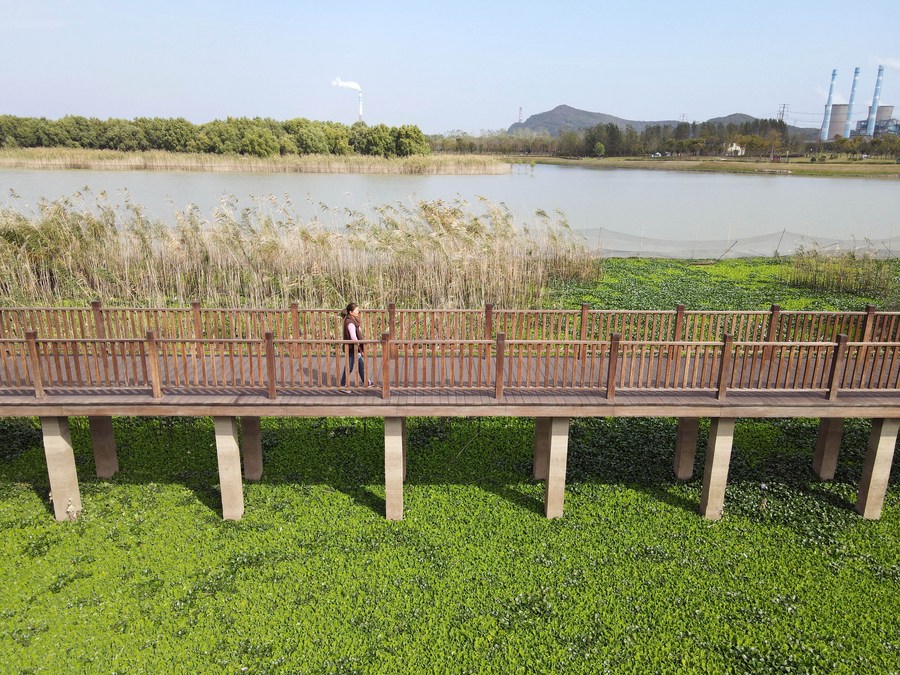-- Chen Lanxiang, a former Chinese fisherwoman, used to have a numerical name San Guniang, which means the third girl in Chinese, because of a mistake made by her illiterate mother. She changed it into a formal name after bidding farewell to her decades-long busy life "on the water" and moving ashore.
-- Chen embraced a new life ashore with government subsidies and social insurance covered. Her family now lives in a 100-square-meter house, as compared to life on the 20-meter-long ship in the past.
-- Starting this year, China instituted a 10-year fishing ban on 332 conservation areas in the Yangtze River basin, which will be expanded to all major natural waterways of the country's longest river and its major tributaries starting from Jan. 1, 2021.
By Liu Jing, Wang Haiyue and Peng Peigen
HEFEI, Nov. 9 (Xinhua) -- Chen Lanxiang, a 47-year-old fisherwoman along the Yangtze River, embraced lots of changes after her new life began ashore, and perhaps the biggest one is having a formal name.
Born as the third child, the then little baby was registered as San Guniang, which means the third girl in Chinese, because of a mistake made by her illiterate mother.
Since then, the numerical name San Guniang has been used on all her official documents. She did not realize the mistake until applying for a marriage certificate at the age of 22.
"Though astonished, I was too busy fishing to change my name then, and people say it doesn't make a difference anyway, as I'm always 'on the water,'" she said.
Chen and her fisherman husband lived in Xuejiawa, a harbor of the Yangtze River where people have been fishing for generations, in the city of Ma'anshan in east China's Anhui Province.

Aerial photo taken on Aug. 15, 2020 shows the view of Xuejiawa in Ma'anshan, east China's Anhui Province. (Xinhua/Liu Junxi)
Just like many others who fish for a living, the couple would steer the boat to catch the fish before dawn and hurry to sell the fish ashore in the early morning.
"Life was hard then. The 20-meter-long ship was our home, and it was chilly in winter and muggy in summer. We were afraid of the windy days for it may overturn our boats," she said, adding that they also saw a plummet in fish catches in recent years.
Her children attended boarding school, and could only reunite with the family on the boat on weekends or holidays.
Things started to change since Ma'anshan implemented a fishing ban starting May 1, 2019, in an effort to protect the biodiversity of the Yangtze River.
More than 10,000 local fishers in this city bid farewell to the trade and settled on land while 5,651 fishing boats were dismantled.

Chen Lanxiang (R) and her husband move their belongings ashore in Ma'anshan, east China's Anhui Province, May 20, 2019. (Xinhua)
Starting this year, China instituted a 10-year fishing ban on 332 conservation areas in the Yangtze River basin, which will be expanded to all major natural waterways of the country's longest river and its major tributaries starting from Jan. 1, 2021.
The couple waved goodbye to their five fishing boats and nets and began a new life ashore.
They received a subsidy of over 240,000 yuan (about 35,767 U.S. dollars), and the government also paid for their social insurance. With the preferential policies, they bought a 100-square-meter house for 200,000 yuan.
Regions along the Yangtze River have been making efforts to improve the livelihood of those affected by the fishing ban. Anhui Province has invested 2.45 billion yuan in implementing the fishing ban so far.

Aerial photo taken on Oct. 31, 2020 shows the compound where Chen Lanxiang now lives in, in Ma'anshan, east China's Anhui Province. (Xinhua/Zhou Mu)
Chen participated in job skill training organized by the local government after coming ashore and is preparing to cooperate with other ex-fishers to set up a domestic services company.
Her husband joined a patrol team to stop illegal fishing on the Yangtze River and clean waste in a park, which earns him over 3,000 yuan a month.
Chen finally had time to change her name with the help of the local government, switching from San Guniang to Chen Lanxiang.
In the past year, Chen has witnessed not only changes in her life but also the transformation of her previous home along the Yangtze River.
Xuejiawa, the harbor where she used to live, was occupied by polluting industries, illegal docks and breeding bases for a long time.
"We had to close the door and windows on the boat because of the heavy dust from the neighboring cement plant," said Chen. "The seriously-polluted water was covered with rubbish."

Aerial photo taken on Oct. 31, 2020 shows Chen Lanxiang walking on a bridge in Xuejiawa in Ma'anshan, east China's Anhui Province. (Xinhua/Zhou Mu)
Last year, Ma'anshan implemented a project to improve the environment along the Yangtze River, with all polluting industries closed and the clean river restored.
Thanks to the efforts, the once dirty place has become an ecological park with clean water, green forests and many visitors.
"When I am free, I like to appreciate the beautiful scenery here. I'm proud of the changes as I also made a contribution to it," Chen said. ■
(Video reporter: Bai Bin; video editor: Zhu Cong.)



